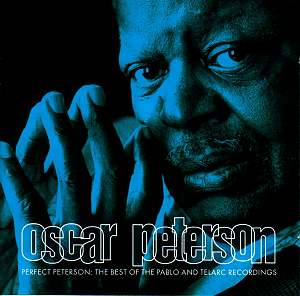CD1
1. Tenderly
2. How High the Moon
3. Nuages
4. Blues Etude
5. Caravan
6. I'm Getting Sentimental Over You
7. Summertime
8. If I Were a Bell
9. (Back Home Again In) Indiana
10. I'm Confessin'
11. Nigerian Marketplace
12. On the Trail
CD2
1. Honeysuckle Rose
2. Kelly's Blues
3. Wheatland
4. In a Mellotone
5. Tin Tin Deo
6. Nighttime
7. Reunion Blues
8. Satin Doll
9. Ja-Da
10. Morning in Newfoundland
Oscar Peterson -Piano
Herb Ellis – Guitar (tracks I/1, 2; II/1-3,
7)
Ray Brown – Bass (tracks I/1, 2, 6; II/1-4,
7, 9)
Joe Pass – Guitar (tracks I/3, 4, 6, 7, 11,
12)
Stephane Grappelli – Violin (track I/3)
Niels-Henning Orsted Pedersen – Bass (tracks
I/3, 4, 8, 11; II/5, 6, 8, 10)
Mickey Roker – Drums (track I/3)
Dizzy Gillespie – Trumpet (tracks I/5, 8)
Clark Terry – Trumpet, flugelhorn (tracks I/8;
II/4)
Eddie "Lockjaw" Davis – Tenor sax
(track I/8)
Bobby Durham – Drums (tracks I/8; II/1-3)
Count Basie – Piano (track I/10)
John Heard – Bass (track I/10)
Louie Bellson – Drums (track I/10)
Martin Drew – Drums (tracks I/11, 12; II/6,
8, 10)
Dave Young – Bass (track I/12)
Benny Carter – Alto sax (track II/4)
Lorne Lofsky – Guitar (tracks II/4, 6)
Lewis Nash – Drums (tracks II/4, 7)
Roy Hargrove – Trumpet (track II/5)
Ralph Moore – Tenor sax (track II/5)
Benny Green – Piano (track II/7)
Ulf Wakenius – Guitar (tracks II/8, 10)
Milt Jackson – Vibes (track II/9)
Karriem Riggins – Drums (track II/9)
The Michel Legrand Strings (track II/10)
Subtitled
"The best of the Pablo and Telarc recordings",
this double CD cherry-picks tracks from Oscar
Peterson’s years with Norman Granz’s Pablo
and related labels (spanning 1953 to 1986)
and Telarc (from 1990 onwards). It really
does contain some of Peterson’s best recordings
– with one small reservation, and it’s the
paradoxical one that sometimes Oscar is just
too good. Several tracks are extremely
fast workouts which display the pianist’s
incredible technique but are a bit too frantic
for comfort.
For
example, Blues Etude is taken at a
very lively pace, with Joe Pass and Niels-Henning
Orsted Pedersen hustling to keep up with Oscar,
who plays plenty of fast stride piano. This
is followed by an equally speedy Caravan
– a duet with Dizzy Gillespie which, again,
is impressive technically but may leave you
longing for something less fiery. The unaccompanied
Indiana and the uncomfortably hectic
On the Trail similarly contain rather
too many fireworks which occasionally misfire.
Dizzy
Gillespie is also heard on If I Were a
Bell, at a blessedly more modest tempo.
His muted trumpet contrasts nicely with the
more mellow sound of Clark Terry. This is
the first of the album tracks that includes
a drummer (Bobby Durham) and I have always
appreciated the impetus which drummers have
given to Peterson’s groups – notably Ed Thigpen
and Martin Drew. Eddie "Lockjaw"
Davis contributes a characteristically muscular
tenor solo.
I
was looking forward to the opening track –
Tenderly – but slightly disappointed
to find that it wasn’t the version I grew
up with, where you could hear the audience
gasping at every audacious step in Oscar’s
improvisation. On this 1953 Tokyo recording,
the Japanese audience is remarkably quiet,
but both versions are very similar – it’s
a tune that Peterson polished up until he
had it just as he wanted it. Both performances
gain immensely from the comforting chug of
Herb Ellis’s guitar and Ray Brown’s double
bass.
The
same trio plays How High the Moon from
two years later. Oscar’s technical proficiency
is firmly in place but the performance also
swings like mad. Nuages is more meditative,
opening with quicksilver guitar from Joe Pass.
Stephane Grappelli’s violin is as romantic
as ever, playing Django Reinhardt’s best-known
composition. Peterson enters with a lyrical
unaccompanied meditation and Stephane rounds
things off with a glorious cadenza.
Other
highlights of the album include I’m Confessin’,
a friendly encounter with fellow-pianist Count
Basie, in which Peterson slims down his style
to match Basie’s economy. Wheatland
exhibits Oscar’s skills as a composer, poetically
evoking his native Canada. The placid tempo
proves that he can impress without any ostentatious
displays. Another original, Nighttime,
is likewise delicate but still has that bluesy
pulse which is at the heart of Oscar’s music.
The bass solo by the much-missed Niels Pedersen
is as miraculous as most of his (and Oscar’s)
playing – the two men both capable of stunning
virtuosity. The album ends with yet another
Peterson original – Morning in Newfounland,
with lush string accompaniment arranged by
Michel Legrand – and sounding remarkably like
one of Legrand’s poignant compositions.
With
first-class sound quality throughout, this
double CD is an admirable introduction to
one of the greatest pianists of the 20th
century – in any idiom.
Tony Augarde
